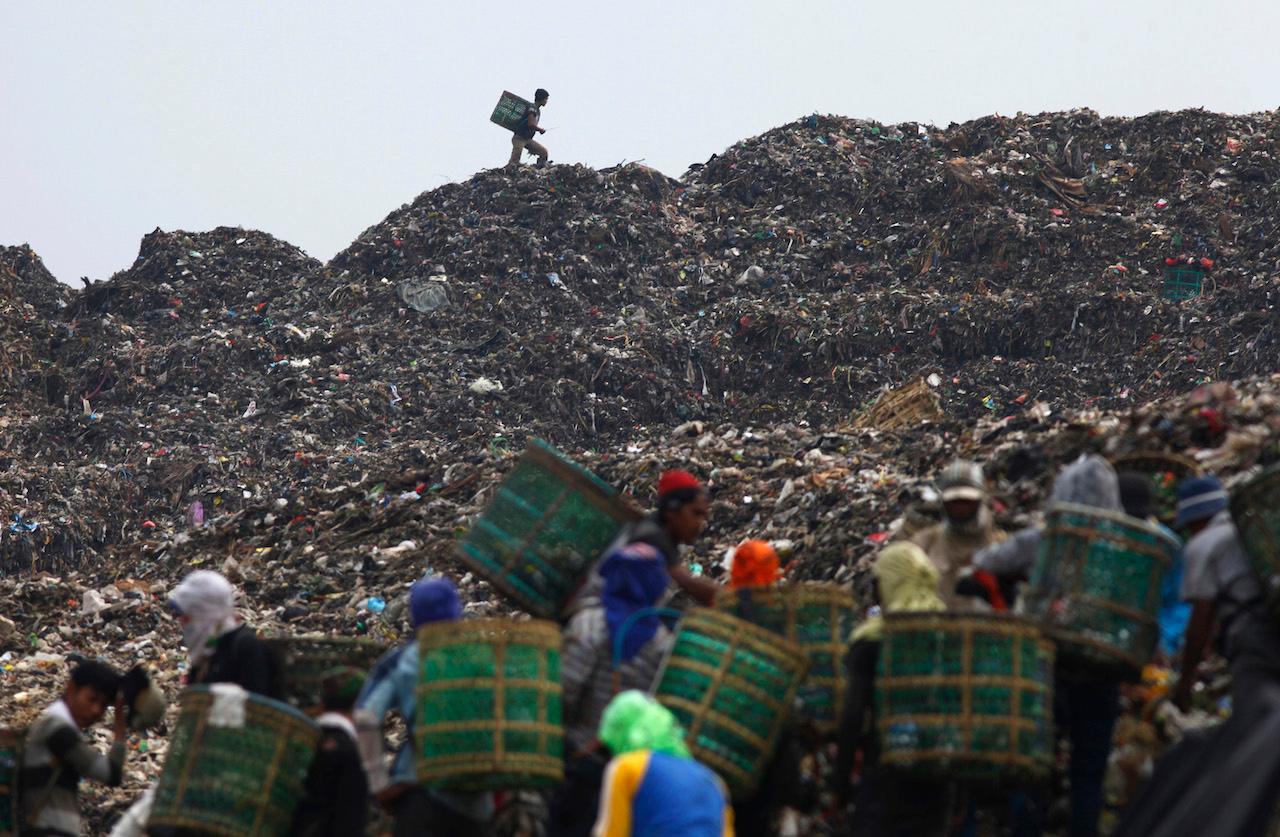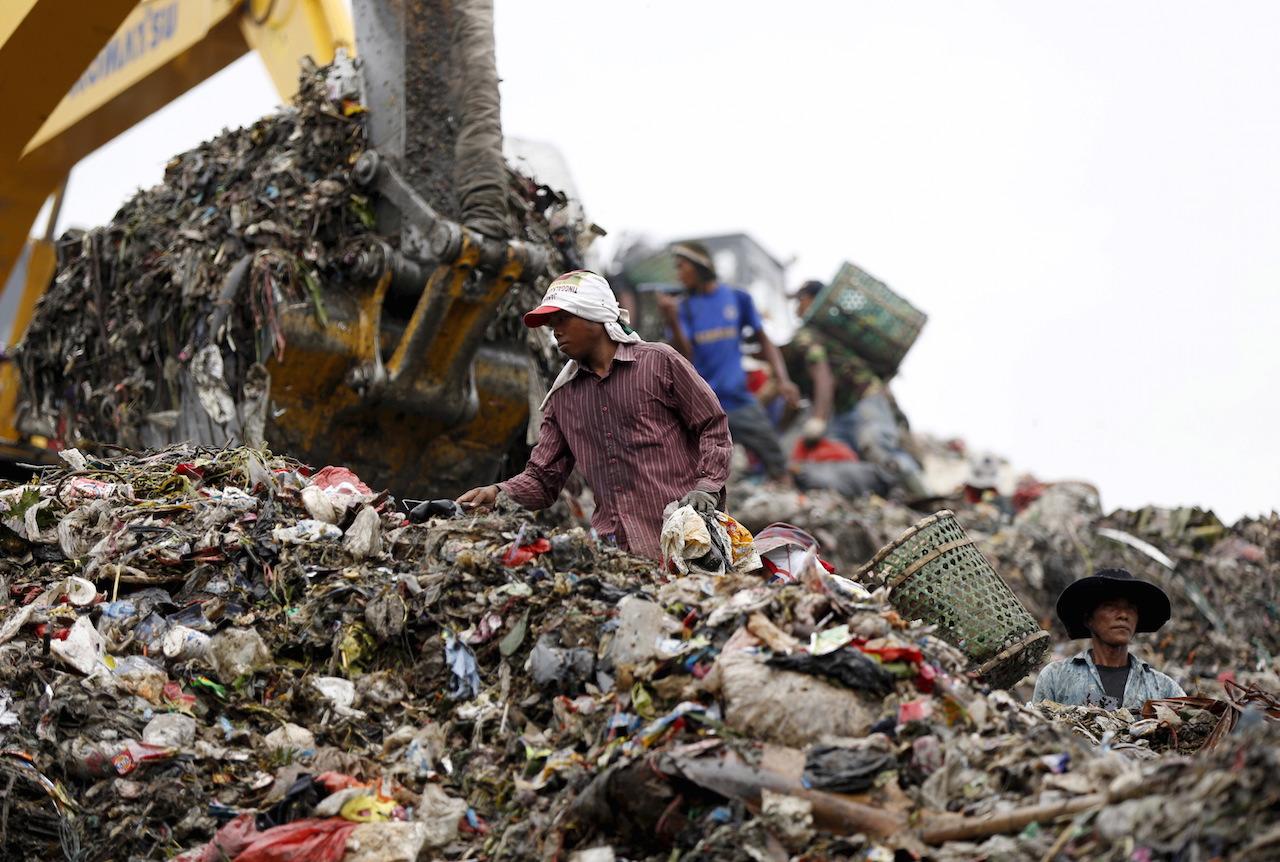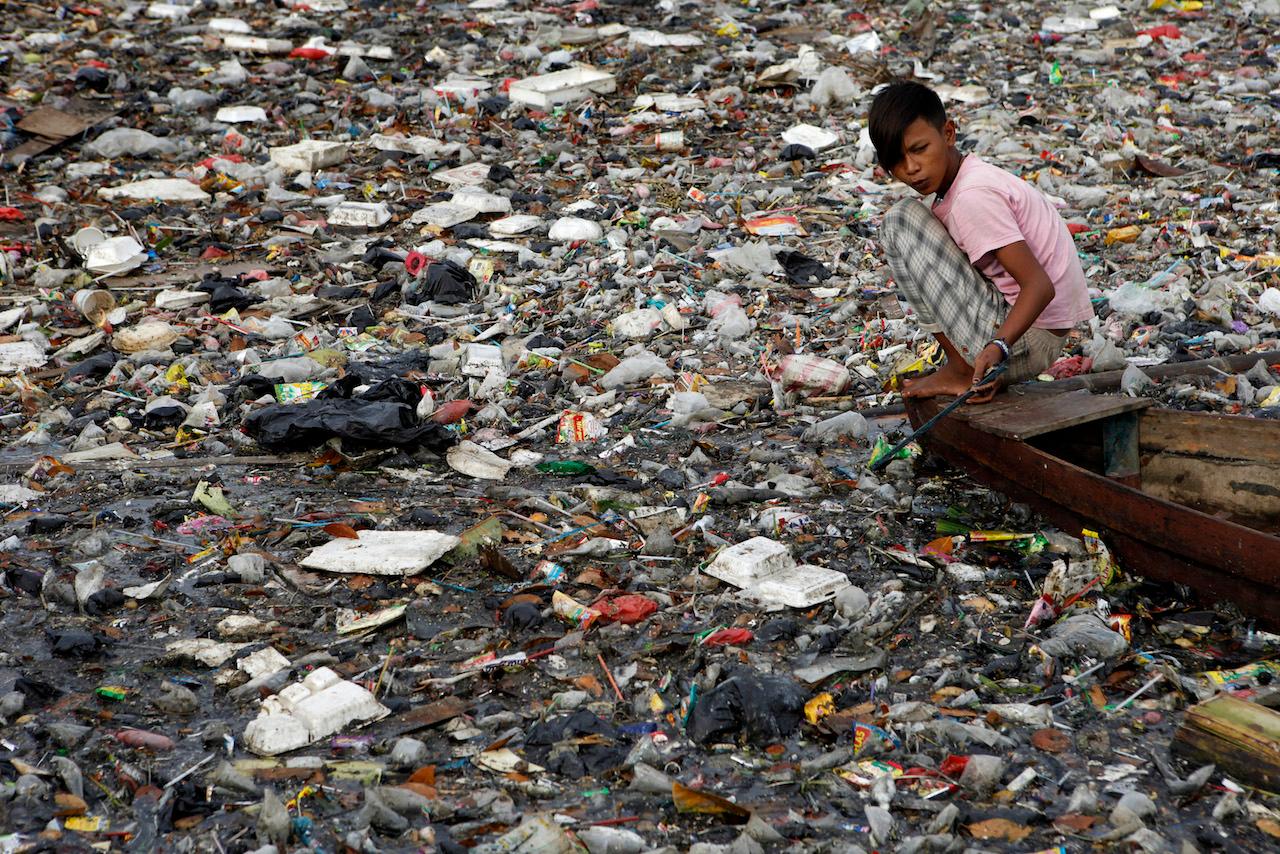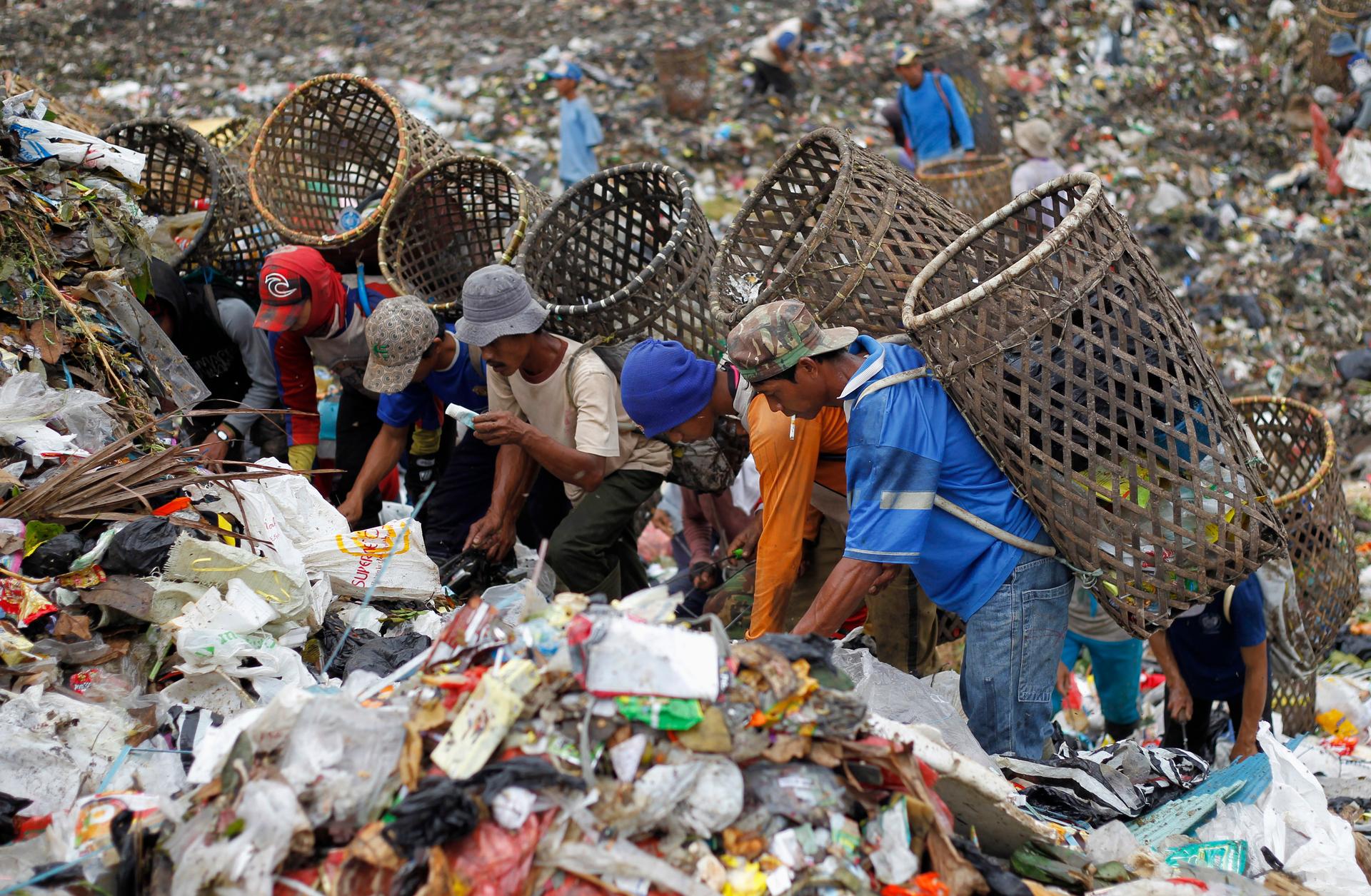The world is ignoring one of cheap oil’s biggest victims
Scavengers search for items to recycle at a waste dump in Bogor, a city in Indonesia's West Java province, on June 3, 2013.
On cable news, the oil market is presented as a great game.
When the price of oil plummets, TV pundits shout about “winners and losers” as stock prices flash below their chins.
The winners? American commuters. The Chinese and Indian nouveau-riche. Basically anyone with a car.
The losers? Russian petroleum barons. The oil-based economy of Venezuela, now mired in chaos. Our thinning ozone layer.
But there’s another population out there that has been devastated by cheap oil. Though they number in the millions, these people have been almost totally ignored.
They’re trash scavengers: men and women, around the globe, who pluck plastic junk from trash heaps and sell it to recyclers.

It’s little surprise that they’ve been forgotten. Scavengers are practically voiceless. They aren’t represented by any lobbyists in Washington, DC. Even in their home cities, they’re largely confined to the shadows.
Scattered from Mexico to Nigeria to Vietnam, trash pickers belong to no single country. But if they did comprise a nation, its population of roughly 15 million would be larger than Belgium and nearly twice the size of Israel.
According to Martin Medina, a scavenging expert with the US National Oceanic and Atmospheric Administration, trash pickers amount to “one percent of the urban population in developing countries.”
These days, they’re hurting bad. Globally, scavengers have seen their incomes eviscerated in the last two years. Before, the majority were scraping by. Now many are forced to scrounge up absurd quantities of plastic just to fend off hunger.
The link between plastic and oil, plastic’s primary ingredient, is mysterious to many scavengers. All they know is that, in late 2014, life started to get much harder.
*****
Consider the fate of Halim, 18 and spindly, a scavenger since the age of 13. He spends most of his waking hours on a literal mountain of garbage.
Halim is one of 6,000 trash pickers who survive off waste at Bantar Gebang, a landfill outside Jakarta, Indonesia.
This is one of Asia’s largest dumps — a heap of trash so high that, from the base, the peak is barely visible. Like sherpas, scavengers scale to the summit each day to sift plastic bottles from the filth.
Indonesians have a word for these workers: “pemulung.” Their job may be dirty, degrading and prone to disease. But at least it’s consistent.
That can’t be said of farming, the traditional catch-all job in so much of Asia. Farmers live in fear of drought or pestilence. One bad year can leave families starving.
Plastic, however, is immune to insects and weather. And it never stops coming. Many washed-up farmers become scavengers, men and women seeking shelter from the fickle hand of nature.
Other hard labor jobs — such as construction or factory work — are finite. But the dump takes all comers. No application required.
“The pemulung are uneducated and disorganized. It’s a pity,” says Yayat Suprianta, an urban planning scholar and government advisor who monitors Indonesia’s waste systems. “Anyone can survive off scavenging. But few want to risk the health problems.”
Even in good times, this is indeed a bad job.
Translucent maggots wriggle at Halim’s feet and cling to his shirt sleeves. Despite the searing heat, he has to dress for an autumn in New England: thick gloves, beanie on his head, heavy boots on his feet.
This is typical scavenger attire. They’re all salvaged clothes, piled on to keep wet, disease-spreading garbage off his skin. “The smell stopped bothering me a long time ago,” Halim says, adding a bit sarcastically: “The maggots are now my friends.”

About two years ago, Halim and his peers realized their lives were shifting in a scary direction. Their bosses — middlemen who sell dirty plastic to recyclers — started paying out much less per kilo. No one was exactly sure why.
This downward slide didn’t stop in 2015. By the end of that year, they were earning roughly half of their usual pay. That rate has mostly stuck until today. For every kilo of plastic he collects, Halim gets 700 rupiah — the equivalent of a nickel.
This crisis has brought an added layer of despair to Bantar Gebang. “People are fighting over cow bones they find in the trash,” Halim says. The bones, when boiled, can produce a belly-filling broth.
“If I’m not strong enough or if I’m daydreaming,” he says, “I’ll miss my chance to grab the bones.”
Halim has no idea why dirty plastic suddenly lost its value. Nor does he know when this awful trend will reverse. But as it turns out, neither do the Saudi sheikhs, Chinese party officials or Wall Street CEOs whose decisions have the power to ruin his life.
*****
You can currently buy a barrel of oil for the price of a family outing at Applebee’s.
It’s hovering around $55, a plunge compared to $100. That was a more typical price before oil’s value crashed nearly two years ago — the outcome of petroleum producers (including the United States) over-saturating the market.
Most plastic is made from crude oil. So when oil is cheap, conglomerates can crank out stuff like soda bottles or throw-away spoons at bargain prices.
Of course, they can always turn to used plastic — giving new life to all that disposable junk people toss into blue or green recycling bins. But why would they bother? At the moment, churning out fresh plastic makes more sense to corporations. It’s catastrophic to the environment, sure, but far cheaper.
When manufacturers lose interest in recyclable plastic, its value naturally falls. Before the oil-price crash, in 2014, a ton of used PET-style plastic (the kind typically used to make water bottles) could sell for $270.
Now it fetches $90.
It’ll stay that low as long as oil is cheap. In cocktail bars and on CNBC panels, economists and Wall Street executives argue about when — or if — the price of oil will ever rise again. But this is like arguing about when and how the stock market will crash next. No one truly knows the answer.
*****
That is the macroeconomic bird’s eye view. At the ground level, inside huts surrounding Jakarta’s trash mountain, scavengers are bewildered by the price change.
They say the price paid for a kilo of dirty plastic has been sliced in half. That means less cash to send their kids to school. It means less protein, like chicken or fish, and more hollowed-out faces. It also means no money for medicine to heal the wounds and infections that come with this job.
“If you get a little scratch from a rotten nail, you don’t want to feel it. You’ve got to keep working,” says Boss Min, 50, an overseer of trash picking gangs. Once a scavenger, now a boss, Min serves as a father figure to young trash pickers.
“But when bacteria gets in there, you’ll turn feverish. Then your bones lock up,” he says. “That’s when you know you’ve got tetanus.”
This is just one of many occupational hazards, Min says. Another is stumbling across dead bodies, often infants in plastic bags.
“There are no legal abortion clinics in Indonesia. So people throw them away,” Min says. “We’ve also found pieces of people — like hands or heads.” The corpses are reported to the police, Min says. Then the scavengers bathe them and bury them in a cemetery near the dump.
The dump contains treasures as well as horrors. Scavengers occasionally find golden necklaces or cash-stuffed envelopes hidden in the debris. Min wears a massive ring, on his left middle finger, that was salvaged from the dump. He bought it off a young trash picker for just $4.
Finding jewelry is rare. A more common treat is expired roti, a popular flatbread. “Supermarkets throw it away. But we can still eat it,” says Sandi, a 35-year-old scavenger and father of three. “Actually, everything we have — our clothes, shoes, my kids’ book bags — is from the dump.”
Like most scavengers around here, Sandi lives in a cluster of huts assembled from salvaged scrap wood and bamboo poles. He rests his bones on a tacky, beat-up leather sofa, the color of grape Kool-Aid, that he dragged off the mountain.
“We have a dirty, stinking job. But we work hard,” Sandi says. “Thank God that people throw out all this waste. Without it, we would have nothing to eat.”
*****
Higher oil prices won’t save scavengers from common maladies like lung infections, or the trauma of stumbling across corpses. Those miseries await anyone who spends enough time on this mountain of trash.
But cheap oil will condemn more children to this life.
When recyclable plastic loses value, parents like Sandi go into crisis mode. They have little choice but to pull their kids out of class and make them wade into the garbage pile with mom and dad.
That can doom a young person to scavenging for years, if not forever.

As a child, Halim was ordered to pick trash by his father, a failed farmer turned scavenger who became too sick to bear the heat and stench. Halim has since ascended into his father’s role. At 18, he is his family’s chief breadwinner.
“My only purpose in life,” he says, “is to make enough money to keep my little brothers and sisters in school.”
Halim is the oldest of six. This life has robbed him of basic pleasures. He can’t seek out love and companionship. “No time for that,” he says. His favorite meal? Grilled goat skewers. But since the plastic price dropped, Halim has eaten it “very rarely. Maybe twice.”
“I don’t have hope anymore,” says Halim, rapidly stuffing used water bottles into a large sack. “I just hope my brothers and sisters will become better people. Not like me.”
When considering Halim’s fate, it’s hard to know what outcome to root for. There are few desirable jobs for illiterate teenagers in Indonesia or anywhere else. Relief could come when oil prices shoot up, but that will only shift the economic pain elsewhere.
The scavenging trade itself is the tragic consequence of out-of-control consumerism. This job may fill millions of bellies. But disposable plastic, the lifeblood of scavenging, is one of the most worrisome pollutants on the planet — a menace that clutters the land and seeps chemicals into the sea.
Meanwhile, in these grueling times, scavengers are now forced to collect outrageous amounts of plastic waste. According to Min, the most prolific pickers can gather 1,000 kilos per week — more than one ton of trash.
But Halim, scrawny and malnourished, can only scrounge about 400 kilos per week. That’s not enough to keep the little ones in school. Halim deeply regrets failing one of his younger brothers, whom he recently pulled out of class to join him on this sun-baked heap of waste.
On a ridge overlooking the slope where Halim stands, an older and more formidable-looking man whoops with joy. He’s just yanked some yellowed, oblong thing from the muck — a treasure he can’t help but brandish to the other scavengers.
It’s a massive cow bone, likely a femur. The man is in luck. There are still some edible tendons clinging to the side.
Patrick Winn reported this story from Jakarta, Indonesia.
The World is an independent newsroom. We’re not funded by billionaires; instead, we rely on readers and listeners like you. As a listener, you’re a crucial part of our team and our global community. Your support is vital to running our nonprofit newsroom, and we can’t do this work without you. Will you support The World with a gift today? Donations made between now and Dec. 31 will be matched 1:1. Thanks for investing in our work!
